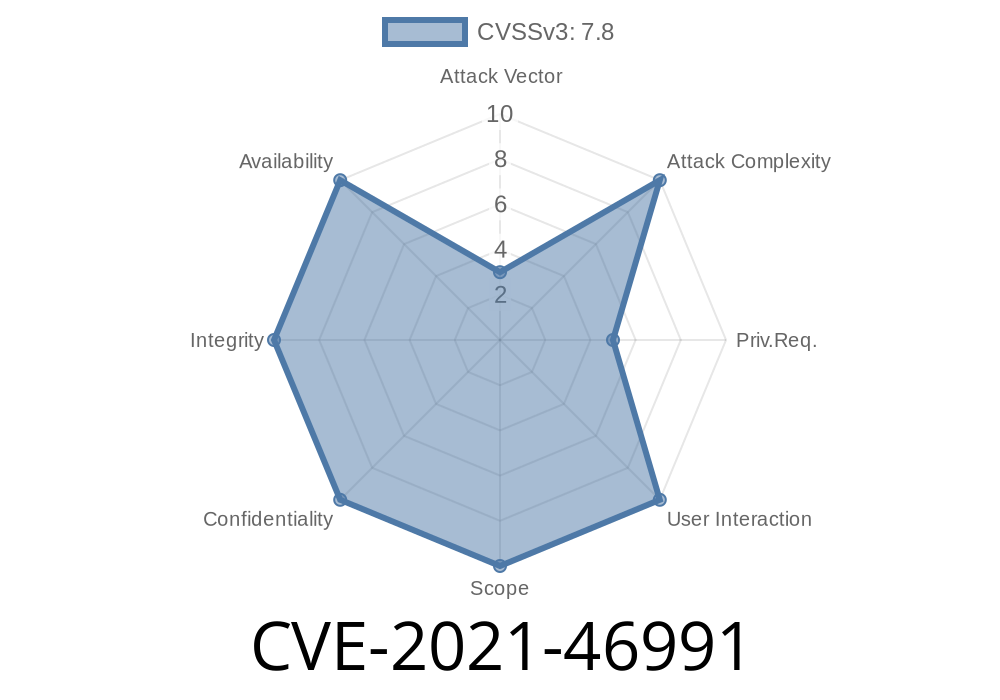In early 2021, security researchers discovered a critical bug, identified as CVE-2021-46991, in the Linux kernel's Intel 40 Gigabit Ethernet driver (i40e). This vulnerability, involving a use-after-free condition, could potentially lead to system crashes or enable privilege escalation attacks. In this article, we'll break down the issue, look at the code, and explain how it was found and fixed.
What is CVE-2021-46991?
CVE-2021-46991 refers to a security flaw inside the i40e driver—a module that helps the Linux kernel communicate with some Intel network cards. The problem lies in how the code managed an object called cinst in memory.
This is called a use-after-free vulnerability.
- Attackers or buggy software might exploit this to either crash the kernel or, theoretically, run harmful code.
Where it happens:
The vulnerable code lives in the function i40e_client_subtask().
Let's look at a simplified code snippet that illustrates this
// Simplified buggy code
if (some_condition) {
i40e_client_del_instance(pf); // This frees pf->cinst
// Problem: the following line uses pf->cinst!
do_something(pf->cinst->lan_info);
}
After the call to i40e_client_del_instance(pf), pf->cinst doesn't point to valid memory anymore. Any further access to it is dangerous.
How it was Discovered
The bug was identified by static code analysis, specifically by Coverity, a tool that checks for programming mistakes before code runs.
It flagged:
> "Read from pointer after free"
This refers to any code reading memory after it's been released—classic use-after-free.
The issue was tracked on the Linux kernel mailing list and discussed among kernel developers.
The Fix
The fix is simple but crucial: add a return statement right after i40e_client_del_instance(). That way, the code doesn't try to touch the freed memory.
Here’s how the corrected code looks
if (some_condition) {
i40e_client_del_instance(pf);
return; // Immediately leave the function to avoid the UAF
}
// Now, pf->cinst is never used after being freed.
You can review the official patch here:
LKML Patch: i40e: Fix use-after-free in i40e_client_subtask()
In real life, this kind of bug can have serious consequences
- System Crash (Denial of Service): Accessing freed memory could crash the driver, freezing the network or, in worst cases, the whole system.
- Privilege Escalation: If an attacker times things just right, they could control what gets allocated at the old memory location, and trick the kernel into running code of their choosing. This is technical, but it has happened with similar bugs.
- Unpredictable Behavior: Even without malice, just normal network activity could trigger bugs, causing flaky behavior.
- Linux kernel source and commit logs
- Patch on lore.kernel.org
- GitHub: i40e_client_subtask Fix
- i40e Linux driver documentation
- Static code analysis with Coverity
- CVE Details: CVE-2021-46991
Conclusion
CVE-2021-46991 is a good example of how a small mistake in memory handling can lead to major problems in complex software like the Linux kernel. The bug, found in the Intel i40e driver, was promptly fixed, but it highlights the need for robust code review and static analysis.
If you're responsible for maintaining Linux systems, it's important to keep your kernel up-to-date and stay aware of these kinds of vulnerabilities.
Timeline
Published on: 02/28/2024 09:15:37 UTC
Last modified on: 12/06/2024 15:27:56 UTC
